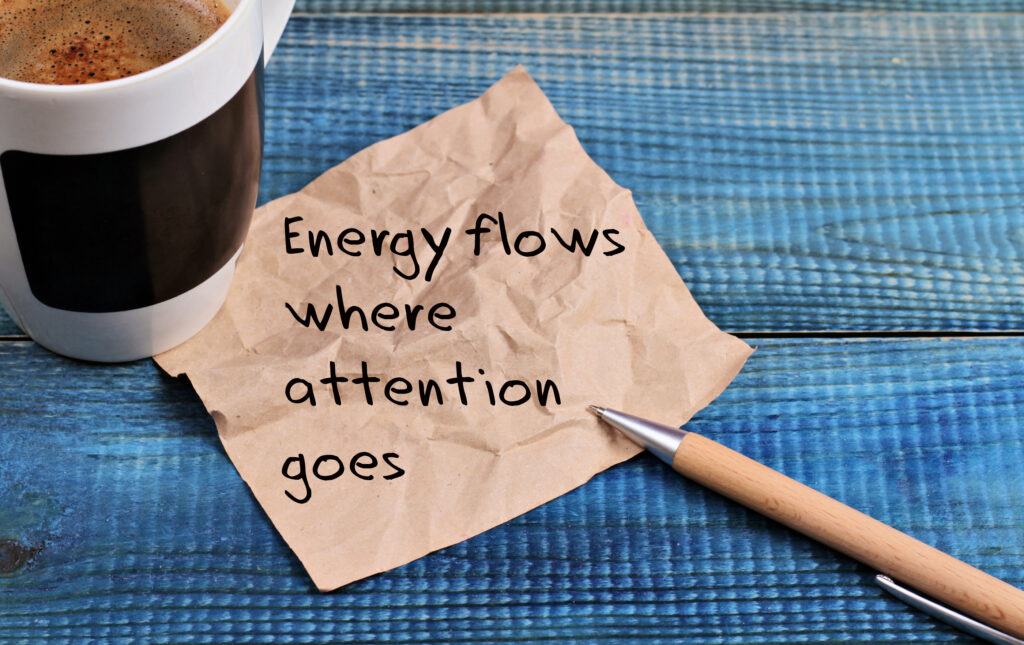
"Concentrate all your thoughts upon the work at hand.
The sun's rays do not burn until brought to a focus."
Alexander Graham Bell
The first two Global IOC blogs of 2024 have focused on gaining clarity about what you want and setting goals. The research states that by the end of January about 80% of resolutions have failed. In addition, Carol Assailian shared at Global IOC’s February webinar that only 8% of goals set by individuals for themselves are met annually. How might you reengage with 2024 goals to ensure that you can be successful with them?
When trying to make changes by putting your dreams and goals into action, the aspect of what you are focusing on becomes paramount. Everyone who has a strong desire to accomplish a goal has the best of intentions to succeed. There may even be elaborate plans to create success with the goal. However sometimes gaps between what is stated as a goal and actions taken do not match. Sometimes this is as simple as putting your attention on your intentions.
Many of us have heard that what we place our attention on grows. Gay Hendricks in “The Genius Zone” suggests that ongoing commitment every morning to the goal(s) that we have set for ourselves is crucial for success. Living in the Genius Zone requires focus and a commitment to conscious choice about how attention and time is distributed throughout the day. Commitment requires perseverance in the face of obstacles. It involves maintaining focus and determination, even when progress is slow, or difficulties arise. Commitment often requires resilience—the ability to bounce back from setbacks and failures. Resilient individuals view challenges as opportunities for growth and learning, rather than reasons to give up.
What are some of the tools to help you stay focused and create this vigilance?
Minimize Distractions
Identify common distractions like your phone, social media, or noisy surroundings, and take steps to minimize or eliminate them. Nir Eyal in "Indistractable: How to Control Your Attention and Choose Your Life" shares a four-quadrant framework for understanding our triggers that either take us into distraction or into our goals. The author contends that we must cope with both external and internal triggers to minimize distractions. Most of us are familiar with external triggers such as phone notifications and pop-ups on our computers alerting us to a new email. But what about the internal triggers like boredom and stress? Eyal advocates for awareness of both types of triggers as well as awareness of whether the trigger is a traction taking us into our goals or a distraction taking us away from them.
Prioritize Tasks
Start by making a to-do list and prioritize tasks based on their importance and deadlines. This can help you stay focused on what's most crucial. Stephen R. Covey in "The 7 Habits of Highly Effective People," Covey introduces the concept of prioritizing tasks based on importance and urgency also using a four-quadrant approach. In determining the most important and urgent tasks, we are able to discern the vital few from the many requests for our time. For those of you who prefer a more structured approach to tasks, David Allen, a productivity consultant, and author of "Getting Things Done" (GTD) shares an approach that emphasizes the importance of having a clear and organized system for managing tasks and commitments. He contends that one cannot simply keep all information in one’s head without losing focus and that by getting everything out of your head and into a trusted system, you can reduce mental clutter and free up mental energy for focused work.
Create a Quiet Workspace
Find a quiet and clutter-free space to work or study. Cal Newport in "Deep Work: Rules for Focused Success in a Distracted World," offers that the ability to focus intensely on cognitively demanding tasks without distraction is becoming increasingly rare and lack of it has a major impact on our knowledge economy. He advocates for creating environments that support deep work, which often involves minimizing interruptions, including noise and other distractions. Newport suggests that quiet workspaces, whether physical or digital, can play a crucial role in facilitating deep work and maximizing productivity. By creating a workspace aligned with deep work, individuals can better concentrate on challenging tasks, achieve higher levels of cognitive performance, and produce higher-quality work in less time.
Take Regular Breaks
Short breaks can rejuvenate your mind and help maintain concentration. Use your breaks to stretch, walk, or relax briefly. Taking short breaks can also help prevent burnout and improve overall productivity by allowing your mind to reset before returning to focused work. Dan Pink, in "When," shares a key insight from the book referencing research that our energy and focus tend to decline over time, punctuated by periods of fatigue and decreased alertness. Incorporating regular rest and renewal into our daily routines is essential for maintaining peak performance and well-being particularly during periods of low energy. These breaks allow us to recharge and restore focus.
Managing Energy Not Time
Tony Schwartz in "The Power of Full Engagement: Managing Energy, Not Time, Is the Key to High Performance and Personal Renewal" emphasizes the importance of managing energy and focus for peak performance. Schwartz believed that the traditional approach of managing time, such as working longer hours or pushing through fatigue, was not sustainable and ultimately counterproductive. Instead, he advocated for a more holistic approach that focused on managing and renewing one's energy throughout the day. In alignment with Pink’s beliefs, he emphasized the importance of taking regular breaks, getting enough sleep, eating nutritious food, and engaging in activities that replenish energy, such as exercise and spending time with loved ones.
Practice Mindfulness
 Cultivate mindfulness through practices such as meditation or deep breathing exercises. Mindfulness can help you become more aware of distractions as they arise and develop the ability to refocus your attention on your goals. For those of you exploring mindfulness as a tool for focus, Williams and Penman in "Mindfulness: An Eight-Week Plan for Finding Peace in a Frantic World" provide a comprehensive and practical introduction to mindfulness and make the information accessible to readers from all walks of life. Keeping one’s attention on the present moment can increase focus and lead to sustained effort and goal achievement.
Cultivate mindfulness through practices such as meditation or deep breathing exercises. Mindfulness can help you become more aware of distractions as they arise and develop the ability to refocus your attention on your goals. For those of you exploring mindfulness as a tool for focus, Williams and Penman in "Mindfulness: An Eight-Week Plan for Finding Peace in a Frantic World" provide a comprehensive and practical introduction to mindfulness and make the information accessible to readers from all walks of life. Keeping one’s attention on the present moment can increase focus and lead to sustained effort and goal achievement.
Many authors agree that putting your attention on your intention can create successful outcomes as you pursue goals. This blog listed a variety of ways along with tools for you to maintain attention on your intention. Hopefully at least one will resonate with you. Make sure you build in rewards and celebrate quick wins and ultimate success!